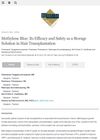 2 citations,
May 2023 in “Current Nutrition Reports”
2 citations,
May 2023 in “Current Nutrition Reports” Eating a Mediterranean diet and taking certain supplements may improve symptoms of PCOS.
 15 citations,
November 2015 in “Trends in biotechnology”
15 citations,
November 2015 in “Trends in biotechnology” Gene regulation could revolutionize hair color by altering pigmentation from within.
 1 citations,
January 2021 in “Research, Society and Development”
1 citations,
January 2021 in “Research, Society and Development” Vegetable oils rich in antioxidants may help prevent skin aging caused by free radicals.
13 citations,
November 2017 in “Neurotoxicity research/Neurotoxicity resarch” Sodium metabisulfite increases sodium channel activity, leading to higher cell excitability and potential damage.
 6 citations,
October 2020 in “Endocrine journal”
6 citations,
October 2020 in “Endocrine journal” A patient with Werner syndrome showed a range of aging-like symptoms and metabolic issues, underscoring the need for early detection and treatment.
 September 2016 in “Hair transplant forum international”
September 2016 in “Hair transplant forum international” Methylene blue is less effective than normal saline solution for storing hair grafts and may reduce graft survival.
June 2021 in “International journal of cosmetics and dermatology” Vitamin C and E may help with certain skin and hair conditions, but more research is needed to confirm their effectiveness.
August 2023 in “Health Sciences and Pharmacy Journal” Herbal therapies may effectively treat alopecia with fewer side effects than synthetic drugs.
 11 citations,
January 2014 in “The Scientific World Journal”
11 citations,
January 2014 in “The Scientific World Journal” Cynatine HNS improves hair and nail quality in 90 days.
1 citations,
September 2019 in “Journal of cosmetic dermatology” Lead and selenium levels don't cause premature graying.






